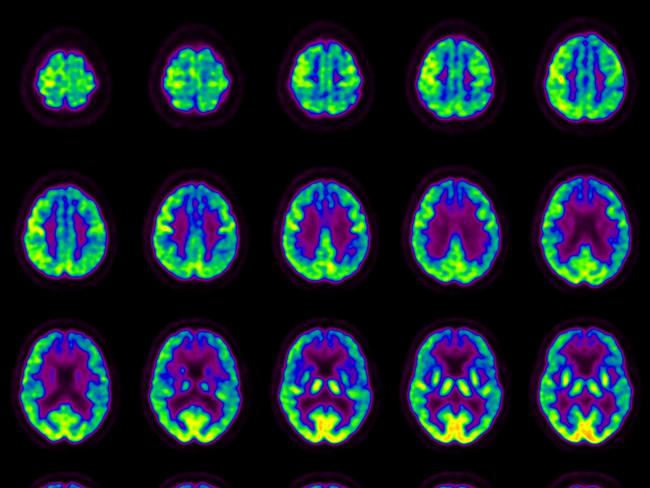New once-a-day pill, Xanamem, could be used to help slow the effects of Alzheimer’s
The drug currently being trialled is just one step away from being hailed as the “holy grail” of treating memory loss and cognitive decline. Here’s how the new medication works.
Health
Don't miss out on the headlines from Health. Followed categories will be added to My News.
A once-a-day pill that targets the production of the stress hormone cortisol in the brain has the potential to be the “holy grail” in the treatment of Alzheimer’s disease, Australian researchers say.
Xanamem, a new therapy being developed by the Australian biotechnology company Actinogen Medical, helps slow down the course of the disease and address cognitive decline.
The disease, which results in worsening dementia symptoms over a number of years, affected 411,100 Australians in 2023, according to Australian Institute of Health and Welfare estimates.
One of the nation’s most high-profile cases in recent years was renowned Australian broadcaster George Negus.

The TV icon suffered from the disease for five years and died at the age of 82 from complications surrounding his illness last October.
Although it is not a cure, Xanamem’s ability to slow or halt cognitive decline, as well as modifying the course of the disease, could offer new hope to patients.
Xanamem is specifically designed to prevent the excess production of cortisol in the areas of the brain that are most affected by Alzheimer’s disease.
This potential could extend to other dementias such as Lewy-Body disease, frontotemporal dementia, and dementia associated with Parkinson’s disease, Actinogen’s CEO Professor Steve Gourlay said.
Over 380 patients and volunteers have been treated with the drug and its low interaction potential with other medications makes it ideal for those on multiple medications.
Two important Phase Two trials, focusing on patients with cognitive dysfunction and depression and mild to moderate Alzheimer’s, are underway.
Prof Gourlay said the firm was working towards a partnership with a global pharmaceutical giant while moving forward with a fully funded trial.
“That’s proceeding well with nearly 30 people enrolled and we’ll hopefully have some interim analysis in the middle of next year and final results about the middle of 2026,” he said.
“If it’s true that this new trial confirms the previous Phase Two data, essentially it would mean that we have the holy grail in Alzheimer’s disease.”
Associate Professor Michael Woodward AO, the world-leading expert in aged care research at Melbourne’s Austin Health, who is heading up the trials, said Xanamem represented a groundbreaking new approach.
“What’s unique about Xanamem is that and there’s never been another drug that can target and control the cortisol synthesis enzyme in brain,” he said.
“And so what happens when you take this drug is that it’s given in very low doses. It gets into the brain, it blocks that enzyme.”


Assoc Prof Woodward said the drug would not block the production of normal cortisol in a patient’s adrenal glands.
“So pressure stays stable and normal cells function,” he said. “It’s a way of targeting this sort of toxic brain cortisol that is associated with ageing, with Alzheimer’s, with depression and many other things.”
Professor Ralph Martins, director of research at Alzheimer’s Research Australia, said
Xanamem’s ability to target cortisol was important as elevated levels have been shown to damage the brain.
“Over the last two years the first disease modifying drugs have become available in the US, China and other countries but not Australia,” he said.
“While these drugs are very effective at removing the offending culprit, namely beta amyloid, their ability to slow the decline in memory and cognition is modest and for a limited period of several months,” he said.
“There is therefore a need for other complementary drugs to play a role in effectively treating Alzheimer’s and Xanamem is a promising candidate.”

Dementia Australia advocate Susan O’Halloran, from Long Jetty on the NSW Central Coast, was diagnosed with younger onset Alzheimer’s disease in 2021.
The 61-year-old former medical scientist said it was a “horrible” disease that left a person feeling like they were “slipping away” and any medical developments that could slow the illness down would be a “blessing”.
She does her best to stay healthy by keeping physically fit with daily gym sessions and dance lessons as well as ukulele lessons and “brain games” to stimulate different parts of her brain.
“I notice my short term memory getting worse and sometimes I just lose the whole day,” she said.
“I have no idea. It can be tricky when you’re trying to talking to someone. You’ve been with someone all day and then in the afternoon you might say, ‘and would you like to do this’? And you’ve been doing it all day.’
She said simple tasks such as paying bills and following instructions proved challenging.
“It’s really horrible because I can feel it at times — just losing not being switched on like I used to be.
“I struggle with that but I know that’s how it’s going to be. So I just try and be inquisitive, try and be positive and think well I will just do the best I can.”
Ms O’Halloran said a treatment like Xanamem that has the potential to slow the illness down would be life-changing.
“Anything that helps slow it down is a blessing. It would have helped me maintain a normal life. And you want to have a safe, normal life as long as possible,” she said.
More Coverage
Originally published as New once-a-day pill, Xanamem, could be used to help slow the effects of Alzheimer’s





